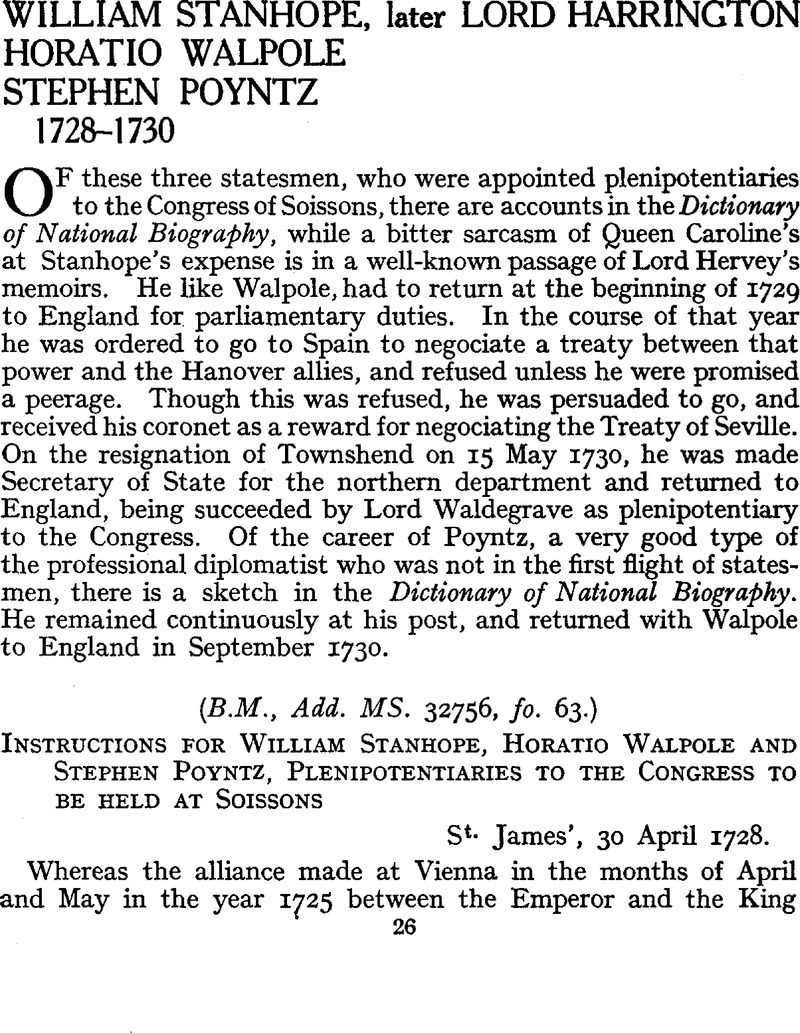No CrossRef data available.
Published online by Cambridge University Press: 24 December 2009

page 28 note 1 The text of the preliminaries can be found in Pribram, A. F., Oesterreichische Staatsvertrāgt, England, Innsbruck, 1907, Vol. I, pp. 457–464.Google Scholar
page 29 note 1 It will be remembered that Stanhope was in favour of conciliating the Spaniards by the cession of Gibraltar in order to secure commercial concessions, and that Townshend while agreeing with his view of the intrinsic value of the place said public opinion would never allow its surrender (see Coxe, , Sir Robert Walpole, Vol. II, pp. 628, 631).Google Scholar
page 30 note 1 The text of this will be found in Rousset, Recueil, Vol. IV, p. 45.Google Scholar
page 33 note 1 See Dumont, , Corps diplomatique, Vol. VIII, p. 32.Google Scholar
page 34 note 1 See Rousset, , Recueil, Vol. II, 1728, pp. 127–177.Google Scholar
page 36 note 1 See Rousset, , Recueil, Vol. IV, 1728, p. 98.Google Scholar
page 37 note 1 Pribram, A. F., Oesterreichische Staatsverträge, England, Vol. I, pp 366–368.Google Scholar
page 38 note 1 A genealogical table showing the rights in this question will be found in Rousset, , Recueil, VII, 1733, p. 340.Google Scholar
page 39 note 1 The disorders arising from the Regency of Duke Charles Leopold had led the nobility of Mecklenburg to appeal for redress to the Emperor who had then appointed George I, as Elector, and the Duke of Wolfenbüttel to be Imperial commissioners for the Duchy. On the death of George I, the Emperor, arguing that the commission had lapsed, issued a decree (11 May N.S. 1728, for which see Rousset, , Recueil, Vol. VII, p. 19)Google Scholar foreshadowing the appointment of the King of Prussia in lieu of the Elector of Hanover. Against this George II protested, but the Emperor (see below, pp. 43, 48) continued as before. (See ProfessorWilliams, Basil in English Historical Review, XV, p. 270.)Google Scholar
page 40 note 1—1 Added in margin in Townshend's hand.
page 41 note 1—1 Added in margin in George II's hand.
page 41 note 2 Of the house of Wittelsbach, viz., Trier, Cologne, Palatine and Bavaria. For these negociations see ProfessorWilliams, Basil, E.H.R., Vol. XV, pp. 321 and 441.Google Scholar
page 42 note 1 For this see ff. 112v–114.
page 43 note 1 Horatio Walpole.
page 43 note 2 Of 11 May N.S. 1728. See p. 39 n.
page 45 note 1 See Rousset, , Recueil, Vol. V, pp. 134–139.Google Scholar
page 45 note 2 The grievances of the princes of the Empire and the double marriages.
page 47 note 1 From the King and Queen of Prussia.
page 48 note 1 For this succession question see Rousset, , Recueil, XIII, pp. 163et seqqGoogle Scholar
page 48 note 1 Youngest daughter of the Regent Orleans.
page 57 note 1 Of 27 January N.S. 1729. See Rousset, Recueil, VII, pp. 60–63.
page 59 note 1 In consequence of the arrest of Prussian recruiting sergeants.
page 62 note 1 This letter, dated 26 December, N.S., is in B.M. Add. 32764, fo. 464, and in Aff. Etr. Angl. 367, fo. 361. A summary of it may be given as that Walpole is opposing the payment of subsidies to the Electors in time of peace ; that he wants to keep out of trouble but will provide ships to transport the Spanish troops to Italy ; that he talks dangerously about France and inspires the Queen with his ideas, and that his protestations of good intentions are untrustworthy.
page 62 note 2 A strong criticism of the treaty with the four Electors and of Townshend's policy in connexion with it will be found in a letter of Horace Walpole to Poyntz, written in France on 4 November 1729, N.S., in Coxe, , Sir Robert Walpole, Vol. II, pp. 659et seqq.Google Scholar
page 66 note 1 M. de Sauveterre, chargé d'affaires.
page 67 note 1 Rousset, , Recueil, Vol. V, p. 331.Google Scholar
page 72 note 1 See Chance, Alliance of Hanover, pp. 626–8.
page 74 note 1 Sister of the Grand Duke and widow of John William, Elector Palatine. (See Rousset, , Recueil, VI, p. 233.)Google Scholar
page 76 note 1 and in Germany in margin in George Il's hand, but struck through.
page 76 note 2 A letter on this subject from Horatio Walpole to Harrington and Poyntz of the same date will be found in Coxe, , Sir Robert Walpole, Vol. II, p. 691.Google Scholar
page 77 note 1 An attack upon Naples.
page 79 note 1 Aff. Etr. Angl. 370, fo. 10. Fontainebleau, 12 May N.S. 1730, e.g. Nous avons effectivement bien éprouvé les principes de la politique des Anglois et la connoissance que nous en avons ne contribue pas peu à nous rendre circonspects sur la manière d'exécuter le traité de Séville, en sorte non seulement que nous ne commencions pas seuls mais que même nos alliés nous secondent dans la suite de nos opérations et qu'ils ne puissent nous abandonner impunément.
page 81 note 1 that in MS.